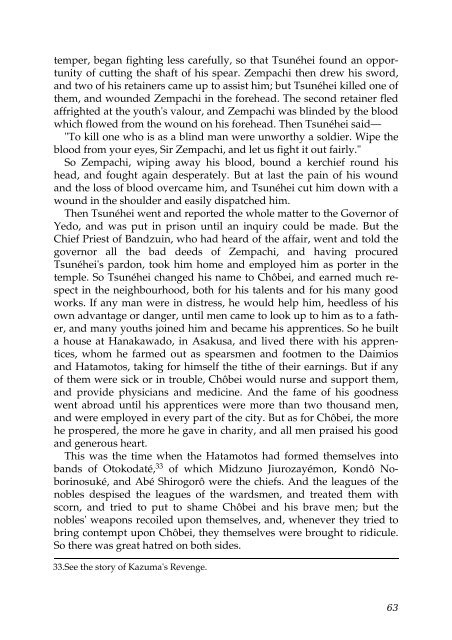Create successful ePaper yourself
Turn your PDF publications into a flip-book with our unique Google optimized e-Paper software.
temper, began fighting less carefully, so that Tsunéhei found an opportunity<br />
<strong>of</strong> cutting the shaft <strong>of</strong> his spear. Zempachi then drew his sword,<br />
and two <strong>of</strong> his retainers came up to assist him; but Tsunéhei killed one <strong>of</strong><br />
them, and wounded Zempachi in the forehead. The second retainer fled<br />
affrighted at the youth's valour, and Zempachi was blinded by the blood<br />
which flowed from the wound on his forehead. Then Tsunéhei said—<br />
"To kill one who is as a blind man were unworthy a soldier. Wipe the<br />
blood from your eyes, Sir Zempachi, and let us fight it out fairly."<br />
So Zempachi, wiping away his blood, bound a kerchief round his<br />
head, and fought again desperately. But at last the pain <strong>of</strong> his wound<br />
and the loss <strong>of</strong> blood overcame him, and Tsunéhei cut him down with a<br />
wound in the shoulder and easily dispatched him.<br />
Then Tsunéhei went and reported the whole matter to the Governor <strong>of</strong><br />
Yedo, and was put in prison until an inquiry could be made. But the<br />
Chief Priest <strong>of</strong> Bandzuin, who had heard <strong>of</strong> the affair, went and told the<br />
governor all the bad deeds <strong>of</strong> Zempachi, and having procured<br />
Tsunéhei's pardon, took him home and employed him as porter in the<br />
temple. So Tsunéhei changed his name to Chôbei, and earned much respect<br />
in the neighbourhood, both for his talents and for his many good<br />
works. If any man were in distress, he would help him, heedless <strong>of</strong> his<br />
own advantage or danger, until men came to look up to him as to a father,<br />
and many youths joined him and became his apprentices. So he built<br />
a house at Hanakawado, in Asakusa, and lived there with his apprentices,<br />
whom he farmed out as spearsmen and footmen to the Daimios<br />
and Hatamotos, taking for himself the tithe <strong>of</strong> their earnings. But if any<br />
<strong>of</strong> them were sick or in trouble, Chôbei would nurse and support them,<br />
and provide physicians and medicine. And the fame <strong>of</strong> his goodness<br />
went abroad until his apprentices were more than two thousand men,<br />
and were employed in every part <strong>of</strong> the city. But as for Chôbei, the more<br />
he prospered, the more he gave in charity, and all men praised his good<br />
and generous heart.<br />
This was the time when the Hatamotos had formed themselves into<br />
bands <strong>of</strong> Otokodaté, 33 <strong>of</strong> which Midzuno Jiurozayémon, Kondô Noborinosuké,<br />
and Abé Shirogorô were the chiefs. And the leagues <strong>of</strong> the<br />
nobles despised the leagues <strong>of</strong> the wardsmen, and treated them with<br />
scorn, and tried to put to shame Chôbei and his brave men; but the<br />
nobles' weapons recoiled upon themselves, and, whenever they tried to<br />
bring contempt upon Chôbei, they themselves were brought to ridicule.<br />
So there was great hatred on both sides.<br />
33.See the story <strong>of</strong> Kazuma's Revenge.<br />
63



